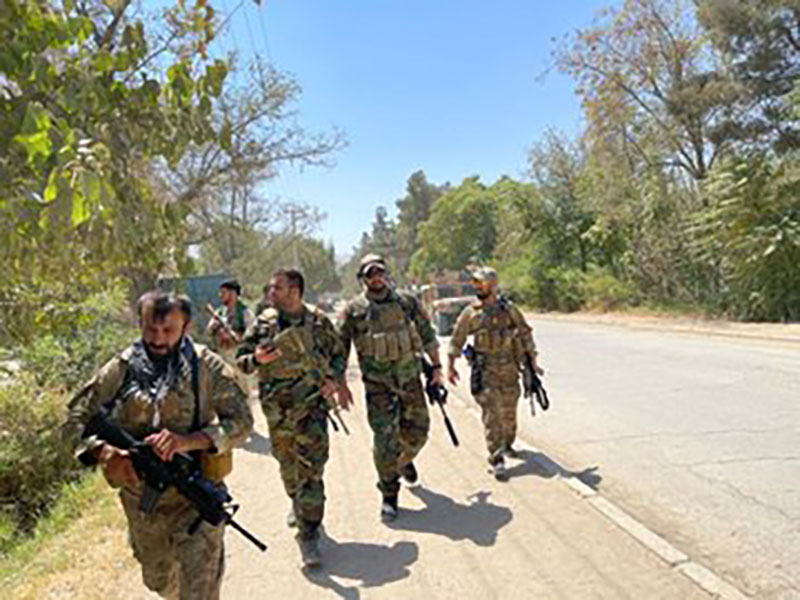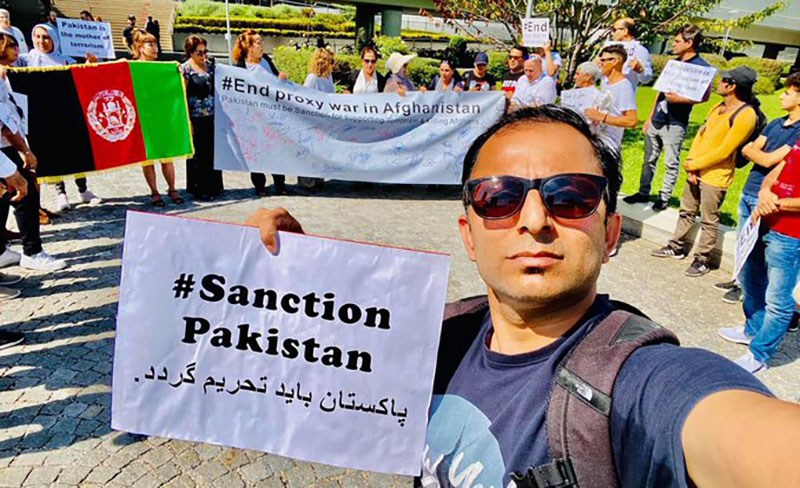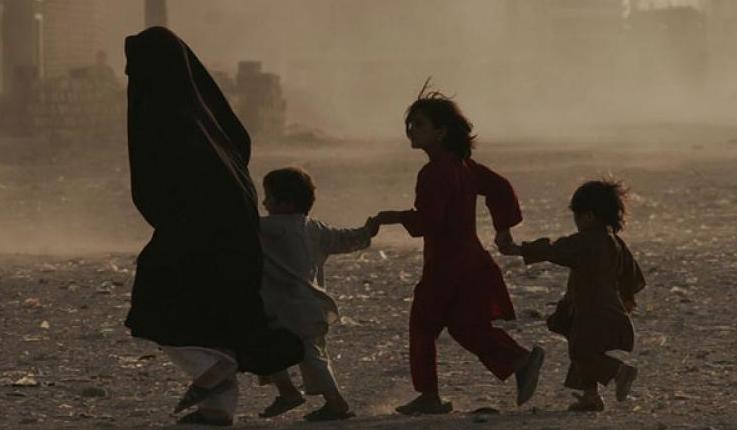 Afghanistan
Afghanistan
The Taliban excesses that have pervaded Afghanistan will lead to disaster for Afghans if left unchecked
United States (US) Secretary of State Antony Blinken on 28 July described attacks on civilians in Afghanistan by the Taliban as “deeply, deeply troubling” and averred that “An Afghanistan that commits atrocities against its own people would become a pariah State”.
The situation as it is evolving in various parts of Afghanistan is indeed dire, especially from the human rights perspective. Reports indicate that the Taliban has re-imposed its radical version of the Shariat in the areas that it has brought under its control, women’s rights in terms of schooling, dress, movement and jobs no longer exist, and mass murder of government officials and their family members, as well as of civilians, has become rampant.
It is, of course, another matter altogether that the US would have known well before it took the final decision to desert Afghanistan that this was exactly what was about to happen when the last of its troops departed from the Bagram Airbase.
Also, unless the US and its Western allies can find a way to forcefully swing the narrative in the direction of ostracizing the Taliban, the backing of some influential regional countries could well help the Taliban circumvent the pariah status.
Human Rights Watch (HRW), in two recent publications, highlighted the atrocities that were being committed by the Taliban, heady from its victory over the US, which if anything was encouraging the terrorist outfit to adopt a more radical posture on the ground.
The Taliban has only ever known one route to power, and one way to rule, that of brutality through the crosshairs of the gun.
The Taliban knows that if left to the will of the people, it will stand no chance. Democracy and human rights are concepts too alien to the Taliban psyche, as also to the Taliban’s methods, to even warrant serious consideration by it.
The wishy-washy assurances that the US negotiating team rushed to accept in Doha notwithstanding, the field level Taliban commander is hardly going to be likely to accept or implement any such promise.
In its 23 July report titled ‘Afghanistan: Threats of Taliban Atrocities in Kandahar’, HRW said that after taking control of districts in Kandahar province the Taliban had detained hundreds of residents whom they accused of association with the government.
Several of the detainees, including relatives of provincial government officials and members of the police and army, were killed in cold blood by Taliban squads.
Patricia Gossman, associate Asia director at HRW added that “There are grave concerns that Taliban forces in Kandahar may commit further atrocities to retaliate against the government and security forces. Taliban leaders have denied responsibility for any abuses, but growing evidence of expulsions, arbitrary detentions, and killings in areas under their control are raising fears among the population”.
Underlining that international humanitarian law prohibits summary executions, enforced disappearances, and other mistreatment of anyone in custody, which are war crimes, Gossman added that “The UN, US, and other countries engaged in the peace talks should urgently call on the Taliban leadership to stop these killings and other abuses”.
In a follow-up report on 3 August, HRW informed that it had “obtained a list of 44 men from Spin Boldak, Kandahar, whom the Taliban have allegedly killed since July 16. All had registered with the Taliban before being summarily executed. Waheedullah, a police commander from Spin Boldak, had obtained a ‘forgiveness’ letter from the Taliban, but Taliban fighters took him from his house and executed him on August 2”.
The report added that “Ghazni residents said that Taliban forces entered their neighborhoods on July 11, after Afghan government forces withdrew from the city. Taliban forces then searched house-to-house, apparently to identify residents who had worked for the provincial or district government or security forces. They took into custody dozens of residents”.
HRW was not the only organization that brought out the excesses that the Taliban was indulging in. Afghanistan’s Independent Human Rights Commission noted that the Taliban had indulged in revenge killings in Spin Boldak.
Saying that at least 40 people had been killed by the Taliban, the organization elaborated, “After taking over Spin Boldak district, the Taliban chased and identified past and present government officials and killed these people who had no combat role in the conflict”. The Embassies of the US and the United Kingdom (UK) in Kabul also issued separate tweets deploring the events in Spin Boldak. They said, “The Taliban massacred dozens of civilians in revenge killings. These murders could constitute war crimes. The Taliban’s leadership must be held responsible for the crimes of their fighters. If you cannot control your fighters now, you have no business in governance later”.
Reduction of violence in Afghanistan, one of the promises that the Taliban had made during the talks, was quite obviously not being taken very seriously by it.
Nor was the pledge to protect critical infrastructure such as government buildings, roads and schools which are already scarce as a consequence of the devastation caused by Afghanistan’s protracted 4-decade-long war.
The Independent Administrative Reform and Civil Service Commission, an Afghan government agency, brought out the scale of the damage in Taliban-controlled areas by revealing that about 13 million people had been left without public services as a result of the destruction of public infrastructure and the halt of social services.
Among the most significant assurances given by the Taliban pertained to the status of women, but misgivings over whether the Taliban would have any interest in practically living up to this promise always lingered.
Sadly, the apprehensions are all coming true.
Mary Akrami, the Director of the Afghan Women’s Network, described the plight of the women thus: “In areas that the Taliban have captured, they are asking women not to come out of their homes. Now, it’s difficult to reach out to women and save them. We are getting news that they are making lists of women in every area in the age group of 18 to 45…
"The Taliban have to respect women and stop the violence. Women have to be given respect as citizens, at least. So my request to the international community is, ‘please do something’”. Radio Liberty and Radio Salam Watandar, both popular Afghan radio stations, reported that Taliban commanders in the north and north-east of the country had ordered local families to marry off one daughter each to Taliban fighters.
"They forbade women from leaving home unaccompanied by a male relative. Those breaking the rules faced punishment, including public beatings.
The Afghanistan Times reported on 4 August that in a shocking incident, the Taliban shot dead a young girl just because she was not wearing a veil.
After accosting the car she was travelling in to get to the Balkh district centre, the Taliban dragged Nazaneen, 21, out of the car and shot her. Husain Haqqani, a former Pakistani Ambassador to the US who is now the Director for South and Central Asia at the Hudson Institute believes that in areas where the Taliban has seized power, mainly in the country’s more religiously conservative countryside, its conduct “is exactly what it was before. They have not changed at all ideologically”.
The Taliban has enforced its own brand of local government based on its interpretation of the Shariat law. Haqqani added that “They have conducted summary executions. They are beating up women. They are shutting down schools. They are blowing up clinics, and they are blowing up infrastructure”.
Voice of America reported that the Taliban have handed out leaflets in some areas that they control ordering locals to follow many of the strict rules imposed under the previous Taliban regime.
On the evidence of all these promises that have already been broken by the Taliban, it will take extremely brave and trusting souls to accept the outfit on its word vis-à-vis another pledge that is of utmost importance to the Western world – that the Taliban will keep the Al Qaeda and the Islamic State (IS) out of Afghanistan and will prevent them from launching attacks directed against the West.
Not surprisingly, recent media reports have suggested that the IS has already begun a major recruitment drive in Afghanistan.
It must also at all times be borne in mind that the last time the Taliban was confronted with a similar predicament, it had not blinked an eyelid before giving up power and escaping into exile in Pakistan rather than hand over Osama Bin Laden to the US. The Taliban’s priorities are as clear now as they were in 2001.
The Taliban’s capacity for cruelty and brutality was brought to the fore earlier this month in the extrajudicial killing of Afghan comedian Nazar Mohammad Khasha. Footage of Taliban terrorists repeatedly slapping the helpless man and then shooting him multiple times sparked widespread anger.
 Image: Habib Khan Twitter page
Image: Habib Khan Twitter page
HRW’s Patricia Gossman, while averring that Nazar Mohammad Khasha had been murdered in cold blood merely for having poked fun at Taliban leaders in his online comedy programme, asserted that “His murder and other recent abuses demonstrate the willingness of Taliban commanders to violently crush even the tamest criticism or objection”. Khasha’s killing reinforces the perception that while the Taliban leaders in Doha strive to present a moderate face before the world, the fighters in the field remain as fundamentalist and vicious as ever.
The UN, meanwhile, has said that civilians were bearing the brunt of the conflict in Afghanistan. It urged all parties to do more to protect civilians or the impact will be catastrophic. As award-winning Pakistani author and journalist Ahmad Rashid told Germany’s Deutsche Welle newspaper last month, “What has changed? Absolutely nothing. The Taliban don’t believe in democracy. They just want the collapse of the government so they can re-conquer Afghanistan and re-impose their system”.
The strategy being used so far by the UN and the US and its allies to warn the Taliban off its violent track before the situation spirals out their control has been to threaten it with isolation.
Last week Deborah Lyons, the UN Secretary General’s special representative for Afghanistan warned, for example, that the world will not work with the Taliban if there was no progress in the peace talks with the Afghan government.
 Image: UNAMA/Fraidoon Poya A family runs across a dusty street in Herat, Afghanistan. (file photo)
Image: UNAMA/Fraidoon Poya A family runs across a dusty street in Herat, Afghanistan. (file photo)
Addressing the Joint Coordination and Monitoring Board (JCMB) meeting at the Presidential Palace in Kabul on 28 July, Lyons said, “If there is no movement at the negotiating table, and instead human rights abuses and worse still atrocities occur in districts they control, the Taliban will not be seen as a viable partner for the international community.
With the territory they have taken the Taliban have inherited responsibilities. The world is watching closely how they are acting, especially towards civilian populations, women, and minorities. The Taliban have gained certain legitimacy in recent years through their negotiations in Doha, but this legitimacy is premised on their commitment to a political negotiation with the Government of Afghanistan, a commitment which their battle-focused strategy casts into doubt.
No major donor will finance the repression of women, let me say that again, no major donor will finance the repression of women, nor any major donor will finance the discrimination of minorities, the denying of education to girls, or the decrees of an authoritarian government.
They cannot do so, not only because these are against the norms of the United Nations and international community, but because a society built on these restrictions cannot and will not function for its citizens”.
The European Union (EU) has also conveyed the same message. Thomas Nicholson, the head of the EU delegation to Afghanistan, was quoted by The Afghanistan Times as saying, “If Taliban rise to power militarily, the EU will not recognise them. We are clearly very concerned about the situation. We are trying to stay involved in Afghanistan as much as possible and will continue our development assistance. We will be involved politically, as well”.
Such a strategy, on the face of it, seems sound. For it to achieve its full potential, however, a more realistic analysis of the contours of the Taliban’s new foreign policy, as also the regional undercurrents at play, would need to be factored in.
The Taliban appears to have identified China as the veritable golden goose, one that will not ask many uncomfortable questions to boot. China has made it known publicly that it sees a predominant role for the Taliban in Afghanistan and that it was happy to work with it. Russia too appears eager to get the Taliban bandwagon up and running. Both these countries, but especially China, would be happy and relieved at the US departure.
Strategically, China will relish the fact that the US unilaterally chose to leave a country bordering China even as it initiated a phase of heightened antagonism with the dragon. China, using its ally Pakistan as a prop, will now look to dig its heels deep into the Afghan landmass and reap whatever wealth and benefits lie therein.
Beijing has reportedly already promised big investments in energy and infrastructure projects to the Taliban, including the building of a road network in Afghanistan.
While international recognition is important for the Taliban, it will not be a Taliban priority to have diplomatic missions in all the world’s capitals.
The primary objective behind the Taliban’s quest for recognition is to enable it to obtain financial assistance from the more affluent countries, of which China is well poised to be an obliging, even if by all accounts exploitative, channel.
Further, with major world powers and veto holders such as China and Russia espousing its cause, the Taliban will believe that these countries would scuttle any moves towards international unity directed against it. As long as such strong immunity is in place for it, the Taliban is unlikely to relent to the demands of the West merely under the threat of what will at best be partial international isolation.
Any strategy that seeks to minimize the Taliban’s excesses, therefore, must henceforth also identify potent leverages with which countries such as China and Pakistan can be kept in check.
Support Our Journalism
We cannot do without you.. your contribution supports unbiased journalism
IBNS is not driven by any ism- not wokeism, not racism, not skewed secularism, not hyper right-wing or left liberal ideals, nor by any hardline religious beliefs or hyper nationalism. We want to serve you good old objective news, as they are. We do not judge or preach. We let people decide for themselves. We only try to present factual and well-sourced news.






